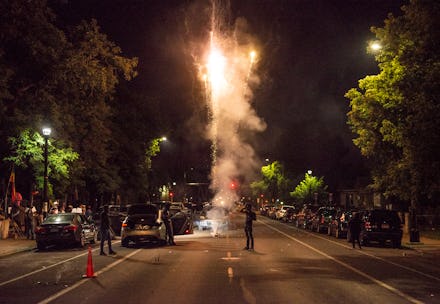"It has nothing to do with the government": Fireworks stores aren't buying viral conspiracy theories

No one can say for sure when it started, or what sparked the heightened activity, but fireworks are definitely happening at a higher rate than most off-holiday weeks in June. There’s been an undeniable surge in sales, complaints, and just the instinctive sense that something is louder than usual in the weeks leading up to July 4. This is true where I live in Pittsburgh, as much as Brooklyn and Philadelphia and Boston, and the numbers bear this out.
The source of this activity, however, is a bit more contested. Although the most obvious explanation — people are home without traditional leisure activities, blowing off steam by blowing things up — is sitting right there, imaginations have wandered to consider it a potential CIA psyop. Over the weekend, a number of Twitter threads confidently invited the possibility of them being a government program sponsored by the CIA or local police departments, depending on who you asked. If you’re following along, the NYPD and other departments are supplying the streets with illegal fireworks, if not outright setting them off themselves, as a means to detract from Black Lives Matter protests, sow further chaos in cities, and rubber stamp aggressive policing to crack down on their proliferation.
The last component, divorced from the rest, might be underway in New York City. Mayor Bill de Blasio announced a fireworks task force on Tuesday, consisting of over 40 law enforcement officials to conduct sting operations and undercover buys. This led to even more fuel to the idea that the fireworks were set off by police in the first place — inviting a problem for them to return to communities they already aggressively police. This comes after a small array of cars slammed on their horns in protest outside Gracie Mansion, one demonstration the NYPD didn’t meet with brutality.
If you ask some of the fireworks store owners and managers in Pennsylvania, they aren’t buying nefarious schemes posited by conspiracists on Twitter. With a name that all but indicates out-of-state clientele, the Tannersville, Pa. based Brooklyn Fireworks has seen an overwhelming surge from New Yorkers looking to stock up on explosives. Partner Jon Weitzel estimates that somewhere between 90-95 percent of the store’s customers come from New York. “Our sales are up at minimum fourfold for consumer fireworks — it’s overwhelming,” he says. “Right now, compared to last year, we have nine additional employees. We’re at max capacity right now, we have a line of people out the door.”
Weitzel’s pretty unequivocal about this being an organic surge in activity and not a government psyop. “I wish I could answer yes to that for you — but I would absolutely say no," he said. "I would say it has nothing to do with the government, and that’s the first time I cannot blame something on the government. Except for the fact that they gave everyone free money.”
On the other side of the state, at the Phantom Fireworks in the Pittsburgh suburb of Monroeville, assistant manager Mike Marcis attributes the surge to people expanding their use of fireworks outside of the traditional holidays like July 4th. “People want to light off some sort of display for their children and family. Compared to years past where they could go to parades or public events for fireworks,” he says. Marcis says that he saw a notable swell in activity for Father’s Day weekend, and notes that other nearby locations where he’s worked in the past, like in Youngstown, Ohio, have seen increased business year-over-year.
A bit further removed from major cities but close enough to the interstate to draw customers who’ve traveled from Ohio, Greencastle’s Keystone Fireworks has also seen a mild uptick. But assistant manager Brooke Passarell balks at the idea of government involvement in the firework pandemonium. “The only thing the government has control over in our store is the tax. There is a 12% fireworks tax, and that’s for anything that goes up in the air,” she says, noting that the tax goes toward first responders helping people who don’t read the directions, to put it lightly.
So is it a CIA operation or just people turning to analog thrills in large numbers during a pandemic that very much hasn’t gone away? The past month has made the former more tempting to believe than usual, but the fireworks conspiracy theorists and their detractors could simply go ride around and ask kids and families setting them off where they got them from. Sometimes it’s easiest to stick with trusting what you can see with your own eyes.